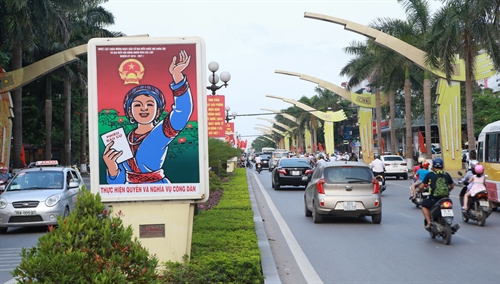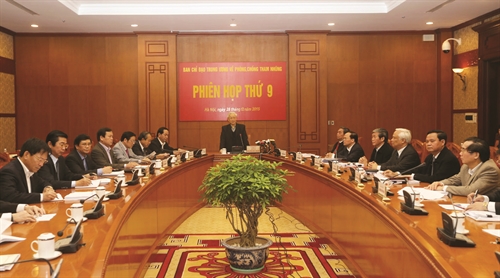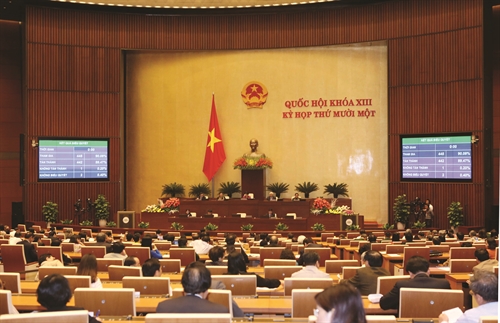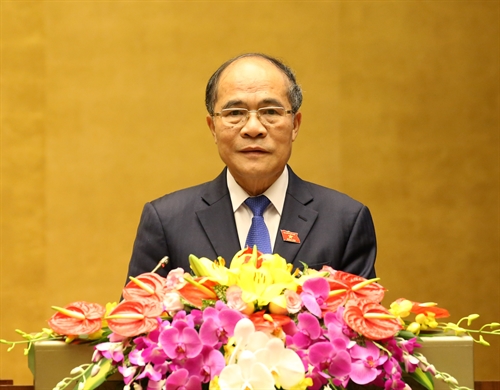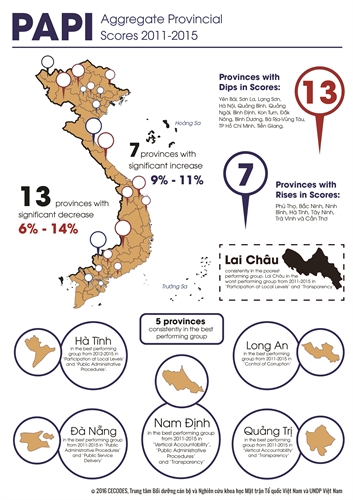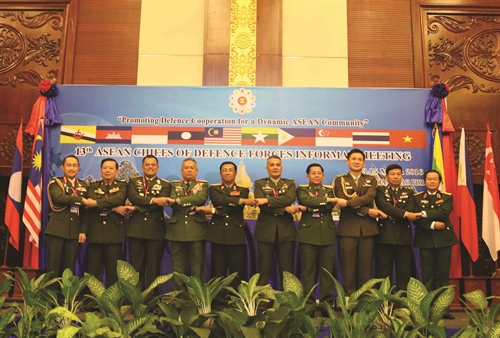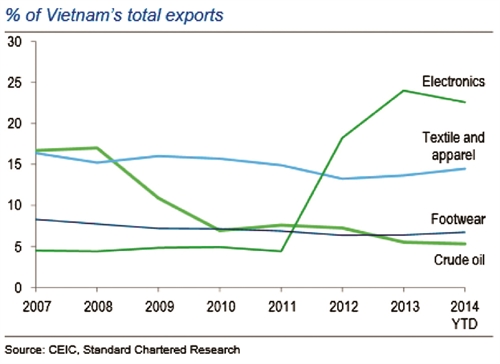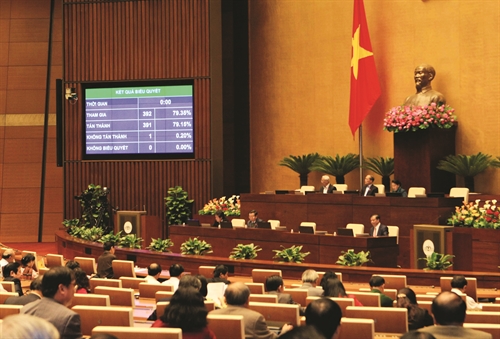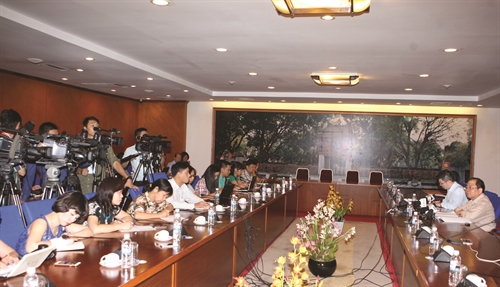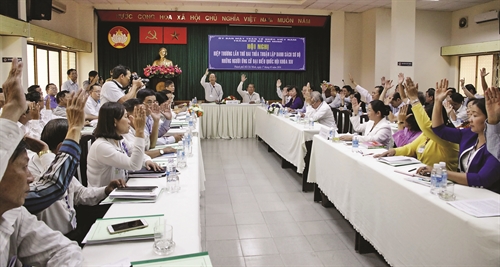Nguyen Van Phung, senior expert
Director of the Large Taxpayers Department
General Department of Taxation
In late 2015, Vietnam wrapped up negotiations for the Trans-Pacific Partnership (TPP) Agreement and EU-Vietnam Free Trade Agreement (EVFTA) with specific commitments on market opening and implementation roadmap. To fulfill such commitments in a more specific and transparent manner, thus creating more favorable conditions for taxpayers and enhancing the tax administration, the XIIIth National Assembly on April 6 passed the Law Amending and Supplementing a Number of Articles of the Law on Value-Added Tax, the Law on Excise Tax and the Law on Tax Administration at its 11th session. Below are some prominent amendments which will take effect on July 1.
Value-added tax (VAT)
The principle of non-discriminatory treatment of imports and home-made products is maintained and the circulation of these products in subsequent business stages is facilitated. Specifically, Clause 1, Article 5 of the VAT Law is revised to free farm produce and domestic animal and aquatic products, which are not yet processed into other products or are preliminarily processed and sold by their producers, and such products at the stage of importation from VAT. At the subsequent business stage, enterprises or cooperatives that pay VAT by the credit method and buy those products for sale to others are not required to make VAT declaration, calculation and payment and may have input VAT credited. This new provision helps agricultural product traders on the domestic market save financial expenses for paying in advance VAT on agricultural products while retaining the right to credit input VAT on packaging, preservation, transportation and management expenses.
The new Law makes it clearer that VAT is no longer imposed on healthcare and animal health services, including medical examination and treatment and disease prevention for people and domestic animals and care for the elderly and people with disabilities (Clause 9, Article 5).
Specific criteria for classification of goods are set out in order to make it clearer that the export of unprocessed or low-value processed natural resources and minerals is not encouraged. The VAT rate of 0% and input VAT credit are not applicable to exports which are unprocessed natural resources and minerals or products processed from natural resources or minerals with the total value of natural resources or minerals plus the energy cost making up at least 51 percent of the product cost. This is provided in the amendments to Clause 23, Article 5 and Clause 1, Article 8 of the VAT Law. The cases of export not eligible for zero-percent VAT are also specified, including transfer of technologies or assignment of intellectual property rights to overseas parties; offshore reinsurance service; credit provision, capital transfer and derivative financial services; outbound post and telecommunications service; and export of aforesaid natural resources and minerals.
The refund of input VAT is more clarified in order to help enterprises speed up the sale of their products and reduce inventories and to put an end to the situation that an enterprise is entitled to VAT refund and obliged to pay VAT at the same time. Article 13 of the new VAT Law has three amended provisions regarding VAT refund as follows:
(i) Business establishments that pay VAT by the credit method and have their input VAT amounts not yet fully credited within a month or quarter may have these tax amounts credited in the subsequent period instead of being entitled to tax refund if having an accumulated input VAT amount not yet fully credited for 12 consecutive months as at present.
(ii) A business establishment that has a new investment project and a VAT amount of at least VND 300 million on purchased goods or services used for investment not yet credited will be entitled to VAT refund. However, the VAT amount not yet credited for the investment project will not be refunded but will be carried forward to the subsequent period for credit, if:
+ The enterprise fails to fully contribute the charter capital as registered, conducts business activities in conditional business investment lines while failing to satisfy the business conditions prescribed in the Investment Law, or fails to maintain the business conditions in the course of operation;
+ The enterprise has an investment project to exploit natural resources and minerals licensed from July 1, 2016, or an investment project to produce goods in which the total value of natural resources or minerals plus the energy cost make up at least 51 percent of the product.
(iii) Business establishments that export goods or services in a month or quarter and have an uncredited input VAT amount of at least VND 300 million are entitled to VAT refund on a monthly or quarterly basis. However, the VAT refund is not applicable to goods imported for export and export goods which are not exported through customs operation areas in accordance with the Customs Law. In addition, the new law provides favorable conditions and incentives for export producers that commit no tax and customs law violations in two consecutive years and taxpayers without high tax risks to enjoy the priority regime of tax refund first and inspection later.
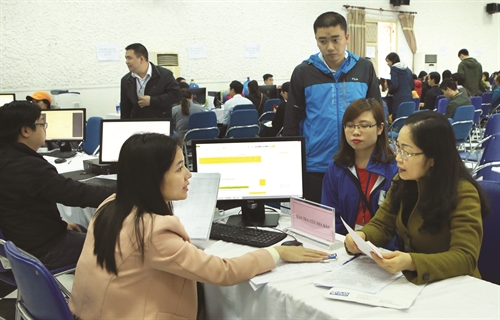 |
| Hanoi Tax Department officers guide taxpayers in making tax finalizations __Photo: Hoang Hung/VNATrang 02 |
Excise tax
The provision on taxed price in Article 6 of the Excise Tax Law is amended. This is the most important amendment which has been subject to divergent opinions of National Assembly deputies and hot debates among business associations. The amended provision aims to ensure the equality between made-in-Vietnam and imported goods liable to excise tax and between domestic producers and importers of the same taxable goods in terms of taxed price, tax calculation method and tax rate. The taxed price of imported goods used for excise tax calculation which is CIF price (import price plus import duty) is now changed to selling price set by importers as currently applied to domestically produced goods. Under the new provision, the Government guarantees equal treatment of domestic businesses and foreign businesses selling goods into Vietnam and the business environment is expected to be more favorable as importers will no longer be able to declare lower prices in contracts with foreign parties and a low customs value to evade taxes at the stage of importation.
The new provision also aims to prevent excise tax evasion by businesses that use the parent company-subsidiary company, joint operation or cross-ownership investment model to perform transfer pricing to evade excise tax at the initial stage and concurrently shift profits to subsequent stages by setting selling prices among companies in the group. It is newly provided that in case goods liable to excise tax are sold to a commercial business establishment having the parent-subsidiary relationship with the seller; or where goods are purchased or sold between subsidiary companies within the same parent company and importers or producers; or where goods are purchased or sold by commercial business establishments having the joint-operation relationship with importers or producers, the price for excise tax calculation must not be lower than a certain percentage compared to the average price at which such establishments purchase goods from importers or producers under the Government’s regulations. As a result, when the Government issues a decree guiding the Law, there will be specific guidance on the percentage appropriately applicable to each goods item (for example, the percentage of discount in the commercial stage applicable to alcohol and beer must be higher than that applicable to automobiles and different to that applicable to cigarettes).
The Excise Tariff and excise tax rates applicable to passenger cars with less than 24 seats are revised (Clause 4, Section I of the Excise Tariff provided in Article 7 of Law No. 70/2014/QH13 on Excise Tax) are revised as follows:
(i) Law No. 70/2014/QH13 provides the excise tax rates applicable to passenger cars with less than 24 seats categorized by fuel consumption rate based on cylinder capacity (cm3), seating capacity and type of used fuel with environmental impact. Specifically, passenger cars with less than 10 seats are subject to the tax rates of 45 percent, 50 percent and 60 percent for the cylinder capacity of up to 2,000 cm3, between 2,000 cm3 and under 3,000 cm3, and over 3,000 cm3, respectively. Passenger cars with between 10 seats and under 16 seats are subject to the tax rate of 30 percent while those with between 16 seats and under 24 seats and cars for both passenger and cargo transportation carry the tax rate of 15 percent. Cars fueled by gasoline (up to 70 percent of total fuel) in combination with electricity or bio-fuel are subject to an excise tax rate equal to 0.7 of that applicable to cars fully fueled by gasoline of the same cylinder capacity;
(ii) In addition to setting specific tax rates for cars categorized on the above principle, the new Law provides a two-phase application roadmap through 2018 (the deadline for realizing the trade liberalization commitments under the concluded agreements). Cars of smaller cylinder capacity and lower energy consumption rate will be subject to lower excise tax rates which are to be reduced compared to the current 2014 Excise Tax Law.
Cars of a cylinder capacity of 2,000 cm3 or more will be subject to higher tax rates up to 150 percent. For example, cars of a cylinder capacity of between over 2,500 cm3 and 3,000 cm3 will be taxed at the rate of 55 percent from July 1, 2016, through December 31, 2017, and subject to 60-percent tax rate from January 1, 2018. Cars of a cylinder capacity of between over 3,000 cm3 and 4,000 cm3 will be taxed at the rate of 90 percent from July 1, 2016. For every additional 1,000 cm3 of cylinder capacity, the applicable excise tax rate will increase by 20 percent. The tax rate of 150 percent will be imposed on cars of a cylinder capacity of over 6,000 cm3.
To encourage the use of bio-energy to protect the environment, the new Law prescribes a very low tax rate for bio-fuel powered cars (only half of the tax rate imposed on gasoline-fueled cars).
Some new excise tax-liable cars are specified in the Tariff, including cars wholly powered by bio-fuel, electrically-operated cars and motor-homes in tax lines 4(e), 4(g) and 4(h).
Tax administration
The provisions on tax exemption and reduction in Article 61 of Law No. 78/2006/QH11 on Tax Administration (amended by Law No. 21/2012/QH13 and Law No. 71/2014/QH13) for taxpayers using non-agricultural land are revised. Tax agencies will give tax exemption or reduction to eligible taxpayers specified in legal documents on taxes and to households and individuals with an annual payable non-agricultural land use tax amount of up to VND 50,000.
Measures of tax coercion will be stayed for taxpayers that are permitted by tax agencies to pay their tax arrears in installments within 12 months from the beginning of the tax coercion period. This provision aims to help taxpayers that have abided by the tax law but are currently facing financial difficulties. The installment payment of tax arrears will be considered at taxpayers’ request and must be guaranteed by a credit institution. Still, the Law prescribes a late tax payment interest rate of 0.03 percent/day on the late paid tax amount (from 0.05 percent under the 2006 Law) to ensure the enforceability of the sanctioning provisions in the context that banks’ interest rates have been sharply falling. All tax arrears arising before July 1, 2016, which taxpayers have not yet paid into the state budget, including those retrospectively collected through inspection and examination by competent agencies, will also be subject to the late payment interest rate of 0.03 percent from July 1, 2016.
If taxpayers that provide goods or services to be paid for with the state budget fail to pay taxes on time and have to owe taxes to the state budget for they have not yet received payments for provided goods or services, they are not required to pay late payment interest for owed tax amounts not exceeding amounts not yet paid by the state budget.-
